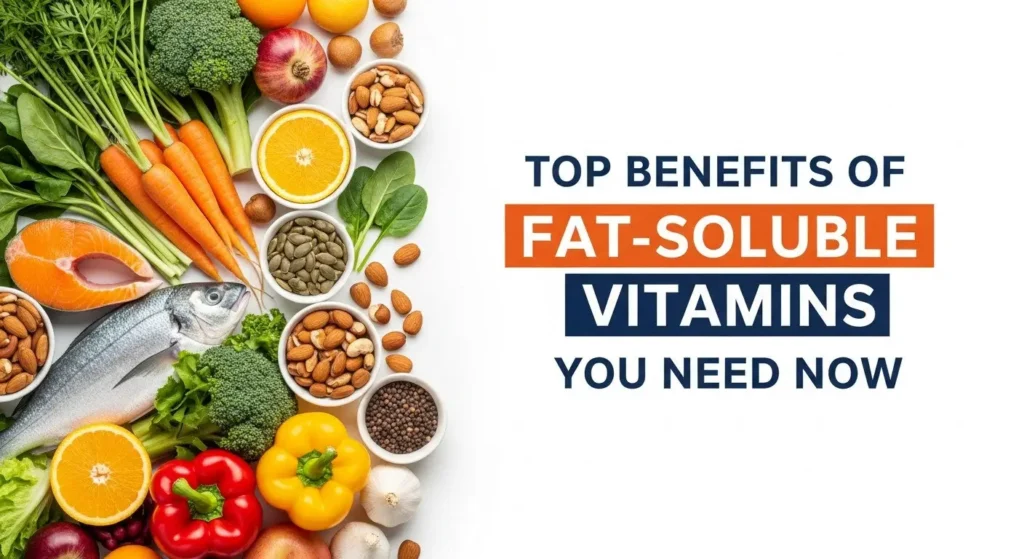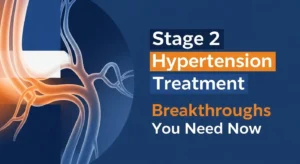You've probably heard that vitamins are super important for your health, but do you know the difference between them? Today, we're going to shine a spotlight on a special group called fat soluble vitamins. These aren't just any vitamins; they're like the secret agents of your body, working behind the scenes to keep you healthy, strong, and full of life.
Unlike water soluble vitamins that your body uses quickly and then gets rid of, fat soluble vitamins are stored in your body's fatty tissues and liver. This means they stick around longer and play a big role in many long-term health functions. Think of them as your body's long-term savings account for health! Knowing about them and making sure you get enough can make a huge difference in how you feel every day.
In this article, we'll explore what makes fat soluble vitamins so special, why you absolutely need them, where to find them, and how they contribute to everything from your eyesight to your bones and even your mood. Get ready to discover the powerful benefits of Vitamins A, D, E, and K!
Explore Your Fat-Soluble Vitamins!
Vitamin A: Vision & Immune Health
Key Benefits:
- Essential for good eyesight, especially in low light.
- Supports a strong immune system, helping fight infections.
- Promotes healthy skin and hair growth.
- Important for reproductive health and cell development.
Top Food Sources:
- **Preformed Vitamin A (Retinol):** Liver, fish (salmon), dairy, eggs.
- **Provitamin A Carotenoids (Beta-Carotene):** Carrots, sweet potatoes, spinach, kale, mangoes.
Vitamin D: Bone Strength & Mood
Key Benefits:
- Crucial for calcium absorption and strong bones.
- Enhances immune system function.
- May help improve mood and reduce feelings of sadness.
- Supports healthy muscle function.
Top Food Sources:
- **Sunlight Exposure:** 10-30 minutes of midday sun several times a week.
- **Fatty Fish:** Salmon, mackerel, tuna.
- **Fortified Foods:** Milk, orange juice, cereals.
- **Other:** Egg yolks, some mushrooms.
Vitamin E: Powerful Cell Protector
Key Benefits:
- Acts as a strong antioxidant, protecting cells from damage.
- Supports immune system health.
- Contributes to healthy skin.
- Aids in healthy blood circulation.
Top Food Sources:
- **Nuts:** Almonds, peanuts, hazelnuts.
- **Seeds:** Sunflower seeds, pumpkin seeds.
- **Vegetable Oils:** Wheat germ oil, sunflower oil, safflower oil.
- **Leafy Greens:** Spinach, broccoli.
- **Other:** Avocado.
Vitamin K: Blood Clotting & Bone Builder
Key Benefits:
- Essential for proper blood clotting and wound healing.
- Works with Vitamin D to build and maintain strong bones.
- May support heart health by preventing calcium buildup in arteries (K2).
Top Food Sources:
- **Vitamin K1 (Phylloquinone):** Kale, spinach, collard greens, broccoli, Brussels sprouts.
- **Vitamin K2 (Menaquinone):** Fermented foods (natto), some cheeses, egg yolks, liver.
Key Takeaways
- Fat soluble vitamins (A, D, E, K) are essential for long-term health and are stored in your body, unlike water-soluble vitamins.
- Vitamin A is crucial for good vision, a strong immune system, and healthy skin, found in colorful fruits and vegetables.
- Vitamin D, often called the “sunshine vitamin,” is vital for strong bones, a healthy immune system, and even your mood.
- Vitamin E acts as a powerful protector for your cells, fighting off damage and supporting your immune system.
- Vitamin K is key for healthy blood clotting and plays an important role in building and maintaining strong bones.
What Exactly Are Fat Soluble Vitamins?
Imagine your body as a bustling city. Vitamins are like the tiny, hardworking employees that keep everything running smoothly. Some employees (water-soluble vitamins like Vitamin C and B vitamins) do their job quickly and leave. Others (fat-soluble vitamins A, D, E, K) are like long-term residents who have their own special apartments (your body's fat stores and liver) where they can stay for a while.
This storage ability is super important because it means your body can use them as needed, even if you don't eat them every single day. However, it also means you can store too much if you take very high doses through supplements, which can sometimes be harmful. That's why balance is key!
To be absorbed, these vitamins need fat. This is why you often hear advice to eat healthy fats with your meals. For example, a salad with carrots (Vitamin A) is even better for you when you add a drizzle of olive oil (healthy fat) to help your body soak up that Vitamin A!
Let's dive into each of these incredible fat soluble vitamins and uncover their unique superpowers.
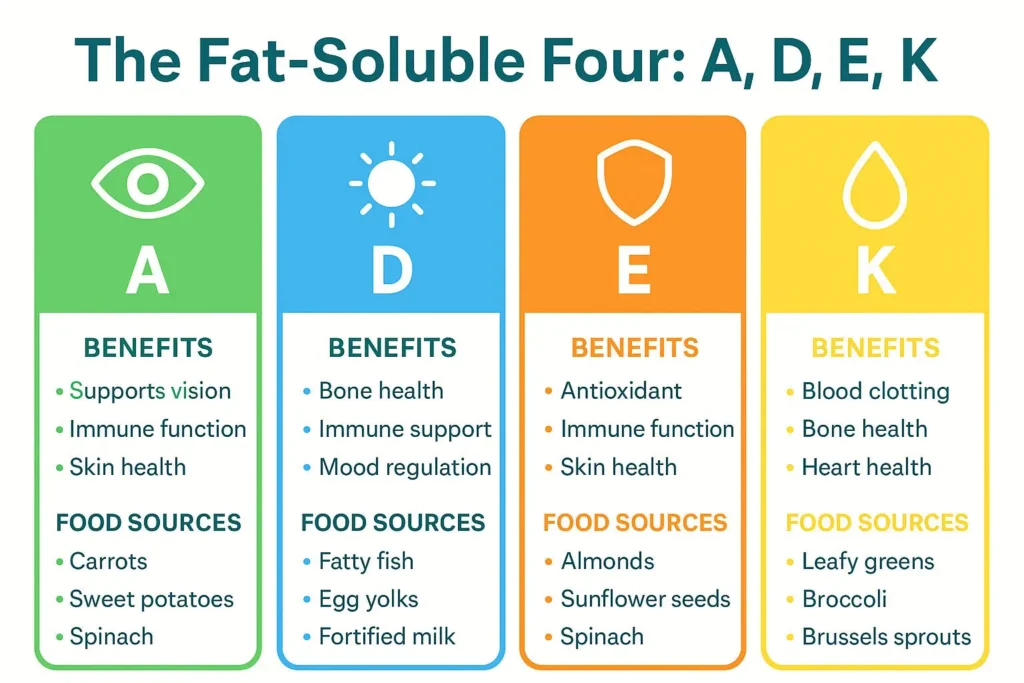
Vitamin A: The Vision & Immunity Powerhouse
Vitamin A is like the superhero for your eyes and immune system. It's a group of compounds, with retinol being the most well-known.
Top Benefits of Vitamin A:
- Sharp Vision: This is perhaps Vitamin A's most famous role. It's absolutely essential for good eyesight, especially in low light. Without enough Vitamin A, you might struggle to see in the dark.
- Strong Immune System: Think of Vitamin A as a general for your body's defenses. It helps your immune cells grow and work properly, making it easier for your body to fight off sickness and infections.
- Healthy Skin and Hair: Vitamin A helps your skin cells grow and repair, keeping your skin smooth and healthy. It also plays a role in keeping your hair strong and shiny.
- Reproduction and Growth: For people of all genders, Vitamin A is important for reproductive health. It also helps in the proper growth and development of cells throughout the body.
“Vitamin A is not just for carrots! It's a foundational nutrient for vision, immunity, and overall cellular health.”
Where to Find Vitamin A:
You can get Vitamin A in two main forms:
- Preformed Vitamin A (Retinol): Found in animal products.
- Liver (beef, chicken)
- Fish (salmon)
- Dairy products (milk, cheese, butter)
- Eggs
- Provitamin A Carotenoids (like Beta-Carotene): Found in colorful plant foods, which your body converts into Vitamin A.
- Carrots
- Sweet potatoes
- Spinach and other dark leafy greens
- Kale
- Butternut squash
- Red bell peppers
- Mangoes
Did You Know? Eating a variety of these foods helps ensure you get enough Vitamin A for all its amazing benefits!
Vitamin D: The Sunshine Fat Soluble Vitamins for Bones & Mood
Vitamin D is unique because your body can actually make it when your skin is exposed to sunlight! That's why it's often called the “sunshine vitamin.” But don't let its sunny nickname fool you; it's a critical player in many body functions, especially bone health.
Top Benefits of Vitamin D:
- Strong Bones: This is Vitamin D's superstar role! It helps your body absorb calcium, the main building block of bones. Without enough Vitamin D, your bones can become weak and brittle.
- Robust Immune System: Just like Vitamin A, Vitamin D is a key supporter of your immune system. It helps your body fight off infections and may even play a role in reducing the risk of certain long-term diseases.
- Mood Booster: Some studies suggest that Vitamin D can impact your mood and may help reduce feelings of sadness or depression. Getting enough sunshine and Vitamin D might just put a smile on your face!
- Muscle Function: Vitamin D is also important for healthy muscle function, helping your muscles contract and relax properly.
Important Note: Many people, especially those who live in less sunny climates or spend a lot of time indoors, don't get enough Vitamin D from sunlight alone. This makes food sources and supplements very important. Getting your Vitamin D levels checked by a doctor is a good idea. For those interested in comprehensive health, including prostate health, maintaining optimal vitamin levels, especially Vitamin D, is often discussed as part of a holistic approach. You can explore more about effective prostate supplements and understanding prostate health options.
Where to Find Vitamin D:
- Sunlight: The best natural source! About 10-30 minutes of midday sun exposure several times a week, depending on your skin type and location.
- Fatty Fish: Salmon, mackerel, tuna, sardines
- Fortified Foods: Many foods have Vitamin D added to them. Look for:
- Milk (cow's milk, almond milk, soy milk)
- Orange juice
- Cereals
- Egg Yolks
- Mushrooms (especially those exposed to UV light)
Vitamin E: The Mighty Antioxidant
Vitamin E is a powerful antioxidant, meaning it's like a tiny shield that protects your cells from damage. It's actually a group of eight different compounds, with alpha-tocopherol being the most active in humans.
Top Benefits of Vitamin E:
- Cell Protector (Antioxidant): This is Vitamin E's main job! It fights against harmful molecules called “free radicals” that can damage your cells and contribute to aging and disease. Think of it as rust-proofing for your body!
- Immune System Support: By protecting immune cells from damage, Vitamin E helps keep your immune system strong and ready to defend against illness.
- Skin Health: Its antioxidant properties are great for your skin. It helps protect skin cells from damage caused by UV rays and pollution, keeping your skin looking healthy.
- Healthy Blood Circulation: Vitamin E helps to widen blood vessels, which allows blood to flow more easily. This is good for your heart and overall circulation.
- May Support Men's Health: While research is ongoing, Vitamin E's antioxidant properties are often studied in relation to overall cellular health, which can include aspects relevant to men's health. For more information on maintaining men's wellness, you might find articles on Prostavive and prostate health insightful.
Where to Find Vitamin E:
- Nuts: Almonds, peanuts, hazelnuts
- Seeds: Sunflower seeds 🌻, pumpkin seeds
- Vegetable Oils: Wheat germ oil, sunflower oil, safflower oil, soybean oil
- Leafy Green Vegetables: Spinach, broccoli
- Avocado
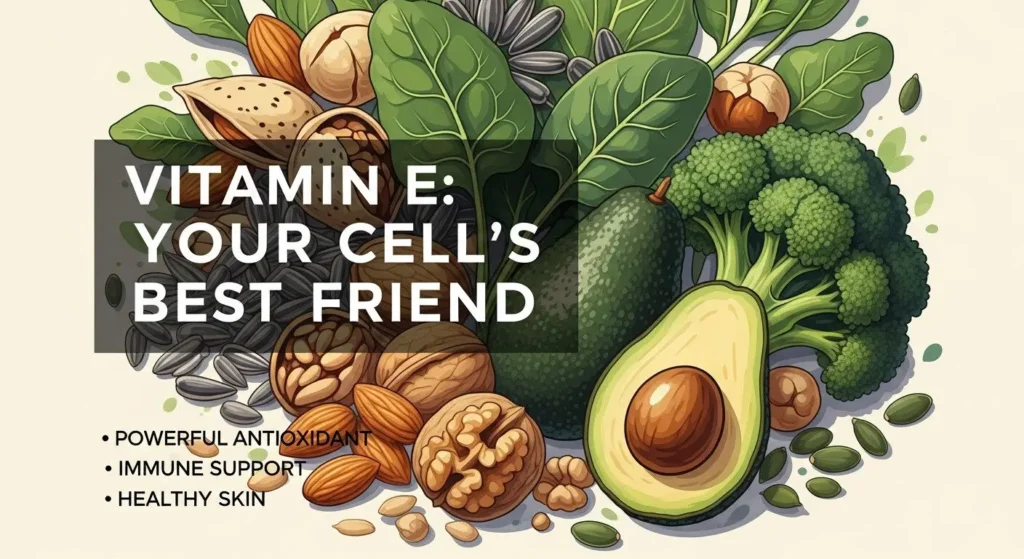
Vitamin K: The Blood Clotting & Bone Builder
Vitamin K is a lesser-known but incredibly important vitamin, especially when it comes to keeping your blood healthy and your bones strong. There are two main types: Vitamin K1 (phylloquinone) found in plants, and Vitamin K2 (menaquinone) found in animal products and fermented foods, and also produced by gut bacteria.
Top Benefits of Vitamin K:
- Healthy Blood Clotting: This is Vitamin K's most famous job. It's essential for making proteins that help your blood clot, which stops bleeding when you get a cut or injury. Without it, even a small cut could be dangerous!
- Strong Bones: Vitamin K works with Vitamin D to help your body use calcium to build and maintain strong bones. It activates proteins that bind calcium to your bone matrix, making them denser and less likely to break.
- Heart Health: Some research suggests that Vitamin K2, in particular, may help prevent calcium from building up in your arteries, which can be good for your heart health.
Where to Find Vitamin K:
- Vitamin K1 (Phylloquinone):
- Dark leafy green vegetables: Kale spinach, collard greens, Swiss chard
- Broccoli
- Brussels sprouts
- Vitamin K2 (Menaquinone):
- Fermented foods: Natto (a Japanese fermented soybean dish is very high in K2)
- Some cheeses
- Egg yolks
- Liver
Synergistic Benefits: How They Work Together
It's not just about each vitamin doing its own job; these fat soluble vitamins often work together like a well-oiled team!
- Bones, Bones, Bones! Vitamin D helps you absorb calcium, but Vitamin K (especially K2) helps make sure that calcium goes to your bones and teeth, not your arteries. They're a dynamic duo for skeletal health!
- Antioxidant Power: Vitamin E is a primary antioxidant, but other fat soluble vitamins like A can also contribute to cellular protection, creating a broader defense system against damage.
- Immune Defense: Vitamins A, D, and E all play roles in supporting your immune system, creating a multi-layered shield against illness.
Eating a varied diet rich in all these vitamins ensures you get the full benefit of their teamwork!
Getting Enough Fat Soluble Vitamins: Food vs. Supplements
The best way to get your fat soluble vitamins is through a balanced diet rich in whole, unprocessed foods. Nature has packed these nutrients into delicious and healthy options!
Prioritize Whole Foods:
- Make colorful fruits and vegetables a big part of your meals.
- Include healthy fats like avocados, nuts, seeds, and olive oil to help absorption.
- Don't forget lean proteins like fish and eggs.
When Supplements Might Be Needed: Sometimes, due to diet restrictions, medical conditions, or simply not getting enough sun, your doctor might recommend supplements.
- Deficiency: If blood tests show you are low in a certain vitamin (like Vitamin D, which is common), a supplement can help bring your levels back up.
- Dietary Restrictions: Vegans, for example, might need to pay extra attention to Vitamin D and K2 sources.
- Specific Health Needs: For those focusing on specific areas of health, such as weight management, supplements might be considered alongside lifestyle changes. For instance, you might find reviews on Liv Pure interesting if you're exploring weight loss support.
Always Talk to Your Doctor: Because fat soluble vitamins are stored in your body, taking too much through supplements can be harmful (toxicity). It's crucial to speak with a healthcare professional before starting any new supplement, especially high-dose ones. They can help you understand your specific needs and recommend the right approach. This is particularly important when considering supplements for targeted health concerns, such as natural solutions for prostate health.
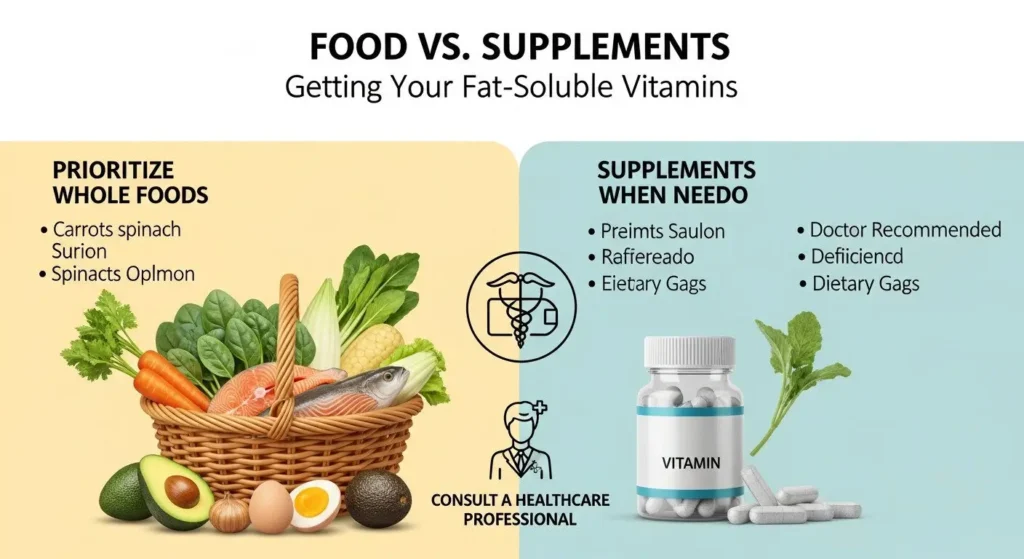
Important Considerations & Risks
While essential, it's important to remember that more isn't always better, especially with fat soluble vitamins.
- Toxicity: Since these fat soluble vitamins are stored, taking extremely high doses over time can lead to a buildup that becomes toxic.
- Vitamin A toxicity can cause headaches, dizziness, nausea, and even liver damage.
- Vitamin D toxicity can lead to too much calcium in the blood, causing nausea, vomiting, weakness, and kidney problems.
- Vitamin E toxicity is less common but can interfere with blood clotting, especially if you're on blood-thinning medications.
- Vitamin K toxicity is rare but can be a concern for those on blood thinners.
- Medication Interactions: Fat soluble vitamins can interact with certain medications. For example, Vitamin K can interfere with blood-thinning medications like warfarin. Always tell your doctor about all vitamins and supplements you are taking.
- Recommended Daily Allowances (RDAs): These are the average daily levels of intake sufficient to meet the nutrient requirements of nearly all healthy individuals. Your doctor can help you understand these for your age and health status.
Conclusion: Embrace the Power of Fat Soluble Vitamins!
Fat soluble vitamins—A, D, E, and K—are truly remarkable nutrients that play vital, long-lasting roles in your health. From giving you sharp vision and strong bones to boosting your immune system and protecting your cells, their benefits are widespread and essential for a healthy, vibrant life.
By focusing on a balanced diet rich in colorful fruits and vegetables, healthy fats, and lean proteins, you're giving your body the best chance to absorb and utilize these incredible vitamins. Remember the power of the sun for Vitamin D, the richness of greens for Vitamin K, the protection of antioxidants from Vitamin E, and the vision support from Vitamin A.
Always prioritize food first, but don't hesitate to talk to a healthcare professional if you have concerns about your vitamin levels or are considering supplements. Understanding and embracing the benefits of fat soluble vitamins is a key step towards unlocking your best health now and for years to come! Nourish your body, and it will thank you.

